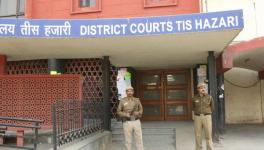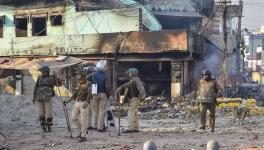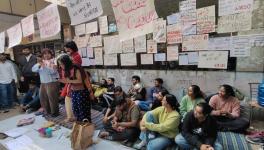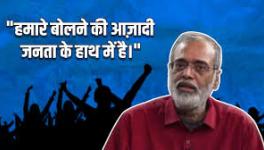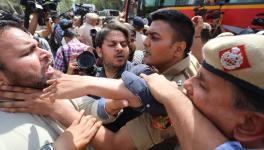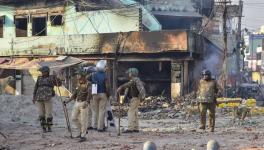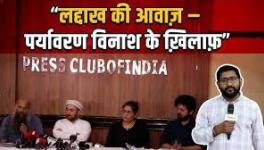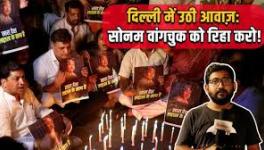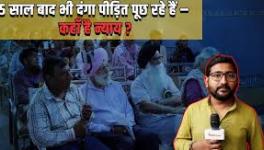JNU Violence: One Year Later, Victims Await Fair Investigation
“How do you expect justice when the people who are expected to deliver justice are the perpetrators of crime?,” these hard hitting words are of Sucharita Sen, who teaches at the premier Jawaharlal Nehru University, as she remembers the horrific violence that unfolded a year ago in the campus, leaving several injured. Sen was one among the many who sustained severe injuries allegedly by the activists of right wing students’ organisation, Akhil Bharatiya Vidyarathi Parishad (ABVP).
Talking about incident and subsequent inquiries, the assistant professor at Centre for Studies in Regional Development, expressed her disappointment with the way her case was treated. “I did not have any expectation from the administration and the police because it was under their watch – the whole incident transpired and the accused were accorded a safe passage to flee. I moved the court as a citizen to seek justice but the judiciary did not consider me a citizen enough for justice. However, the more important part is about how the sense of campus has degenerated. The collective trauma of an unprecedented violence in the history of the country will always hurt us,” she said.
Post the bloody violence in the campus, the Delhi Police and the university administration began their separate inquiries to identify and punish the culprits. But, both inquiries seem to have been thrown in cold storage. Reports suggest that the internal inquiry initiated by the university administration has been shelved. The teachers and students injured in the violence denied being contacted by the five-member committee instituted by the administration.
Saket, vice president of the Jawaharlal Nehru University Students’ Union, who barely escaped the attack, told NewsClick, “I think people did not find the time to recover from trauma. Most of the students moved out of campus soon after the incident. Later the campus was closed due to the pandemic. So, we never got the time to heal ourselves.”
On being asked if they have any hope of justice being delivered, he said, “We are remembering the day to keep it fresh in our minds that the violence was unleashed on unarmed students, who were asserting their right to protest for an education that does not leave out the poor and marginalised. As far as the investigation is concerned, I think the students understand it very well why the fair investigation is still pending.”
Following the violence, the Delhi Police addressed a press conference in which they identified a few members of the left students’ organisations and two unnamed members of the ABVP. Even though, initially three FIRs were registered in Vasant Kunj (North) Police Station, Delhi Police Commissioner Amulya Patnaik transferred the investigation to Crime Branch, following the setting up of a 20-member team who camped themselves at the administration block in the university for more than a month.
Also read: JNU Violence: Delhi Police Give Clean Chit to Themselves, Victims Do Not
However, later, the team was transferred to investigate the riots in North East Delhi in February 2020. Until the transfer, the team had questioned 88 persons including Komal Sharma who was allegedly spotted holding a iron stick at Sabarmati Hostel in campus. But, she maintained that she was framed by some people in the case.
In a statement, Satish Chandra Yadav, secretary of JNUSU who had sustained injuries a day before in a separate incident, recalled the evening of January 5, saying, “The intensity of the violence was horrifying, but it is the pattern of this whole operation which is ghastly. Screenshots of WhatsApp messages exchanged before the attack clearly pointed to the planned nature of the attack and the involvement of both insiders and outsiders, including known ABVP activists from JNU and DU.” The statement added, “There are video clips of masked men roaming the streets and leaving the campus in the presence of police after carrying out the attacks, making it fully clear that the operation was carried out in connivance with the police and the university security. The attackers also appeared to have chosen their targets quite selectively. Left student activists and Muslim students were specifically targeted, rooms with posters or books suggesting BJP (Bharatiya Janata Party) affiliation were conspicuously left out. The police intervened later only to block off the roads leading to the JNU campus to stop Delhi citizens from rushing to the rescue of the students under attack.”
Highlighting that the incident was a continuation of the attack on the university, he said, “The January 5 masked attack on JNU has been preceded by relentless adverse propaganda against the university and a ceaseless war on the environment of debate, democracy and academic excellence that made JNU a distinguished institution of higher education and research with an international reputation. The use of terms and expressions for JNU students like tukde-tukde gang, freeloaders feeding on public money and the portrayal of JNU as an anti-national den of evil have all been aimed at defaming the institution in public perception and facilitating and legitimising the kind of organised violent attack that we saw on January 5 evening.”
Meanwhile, JNU Registrar Pramod Kumar remained unavailable for comments on the incident despite repeated attempts.
Also see: JNU Violence: Delhi Police Presents Incomplete Picture?
Get the latest reports & analysis with people's perspective on Protests, movements & deep analytical videos, discussions of the current affairs in your Telegram app. Subscribe to NewsClick's Telegram channel & get Real-Time updates on stories, as they get published on our website.









